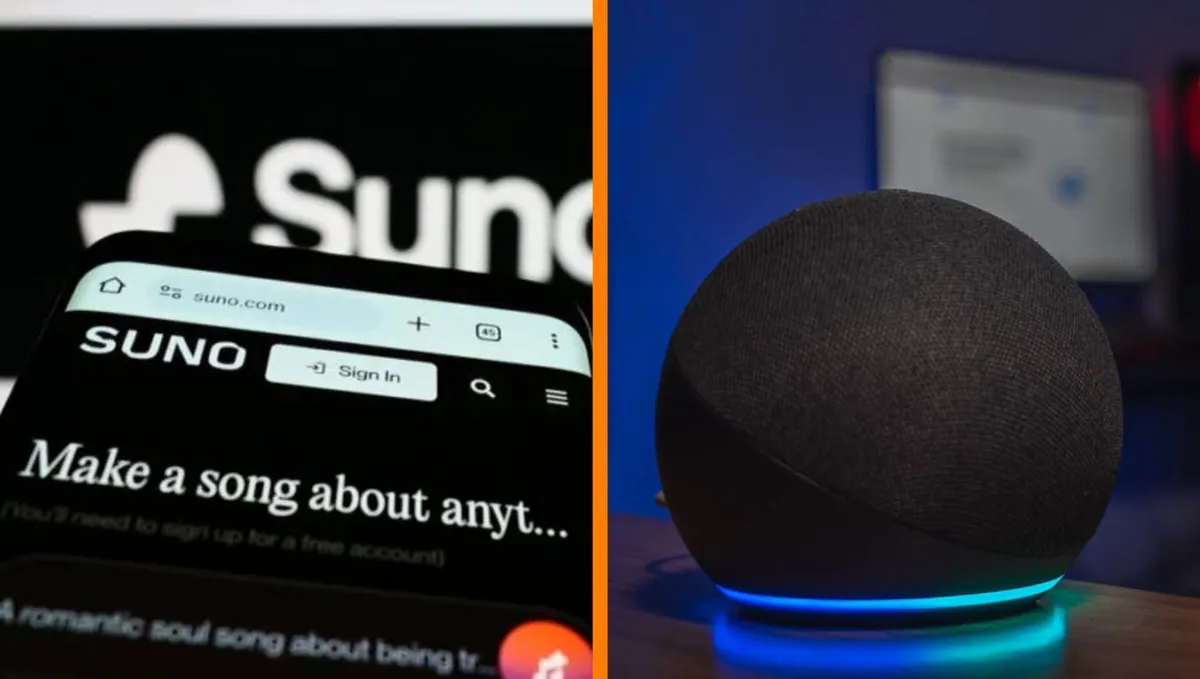
Suno, an innovative AI music generator, has been making significant headlines in recent months. Recently, the company, valued at $500 million, faced a lawsuit for copyright infringement filed by GEMA, the German collection society and licensing body. This legal challenge follows a previous lawsuit from major record companies in June, where Suno was accused, along with fellow AI firm Udio, of unlawfully using their recordings to train its systems. Notably, court filings from August indicated that Suno largely acknowledged these allegations.
Despite its controversial standing in the music industry, Amazon, the parent company of Spotify competitor Amazon Music, has chosen to collaborate with Suno. In a recent blog post, Amazon announced a next-generation version of its voice assistant, Alexa+, which now integrates Suno’s capabilities. This integration allows users to transform simple, creative requests into complete songs, encompassing vocals, lyrics, and instrumentation.
Amazon elaborated on this feature, stating, “Using Alexa’s integration with Suno, you can turn simple, creative requests into complete songs, including vocals, lyrics, and instrumentation.” This innovation opens up a world of possibilities for users looking to create personalized music experiences.
In a social media announcement, Suno expressed its excitement about the partnership, stating, “We’re so excited to announce that Suno will be coming to Alexa+, so you can make any song you can imagine with the next generation of Alexa. What songs will you make with your Alexa?” The integration comes just four months after renowned producer Timbaland joined Suno as a strategic advisor, following extensive use of the platform.
Amazon's engagement with AI companies facing challenges in the music sector is not limited to Suno. The tech giant is also a significant investor in Anthropic, the AI developer that was sued last February by major music publishers, including Universal Music Publishing, Concord, and ABKCO, for alleged copyright violations. Last month, these publishers welcomed court-approved guidelines in their ongoing legal dispute with Anthropic.
With a staggering $4 billion investment in Anthropic last fall, Amazon’s total investment in the company has reached $8 billion. Anthropic’s Claude chatbot is also integrated into Alexa+, enhancing the assistant's ability to respond quickly and accurately.
Alexa+ introduces a suite of features aimed at improving user interaction with music. Users can track their favorite artists and stay updated on new releases. Amazon notes, “Have questions about that new song trending online, or want to know when your favorite artist drops a new track? Just ask Alexa+ and receive the answers and alerts you need.”
Additionally, the platform enhances music listening experiences, allowing users to easily shift music playback across multiple devices. For example, users can instruct Alexa+ to “play the music upstairs” or “play the music everywhere except the kids’ rooms.” The integration with Ticketmaster also enables users to find tickets for upcoming events, with notifications sent directly to the Alexa app when tickets become available or drop to a desired price range.
Currently, Alexa+ is in “early access” mode for users of the Echo Show tablet (models 8, 10, 15, and 21) and is available in English to users in the US. Future plans include expanding availability to all Echo devices, excluding certain older models. Amazon has yet to provide a timeline for wider rollout or support for additional languages.
For Amazon Prime subscribers, Alexa+ will be free, while non-subscribers will incur a monthly fee of $19.99. Beyond music, Alexa+ boasts capabilities that encompass various services and devices, as highlighted by Amazon's SVP of Devices and Services, Panos Panay. He stated that Alexa+ can orchestrate tasks across tens of thousands of services, marking a significant advancement in voice assistant technology.
Users will also have the ability to customize the information Alexa+ retains about them, including the option to upload documents and personal details. This functionality raises privacy concerns; however, Amazon assures users that their data will be protected through a secure infrastructure powered by AWS (Amazon Web Services).
For businesses interested in integrating with Alexa+, Amazon has introduced a range of software development kits (SDKs) designed to enhance functionality. These SDKs enable Alexa+ to perform specific actions, such as purchasing concert tickets or interacting with enterprise websites.
With the integration of Suno and the continuous evolution of Alexa+, Amazon is carving a distinctive path in the intersection of AI technology and the music industry. As the landscape continues to change, it will be exciting to see how these developments unfold.